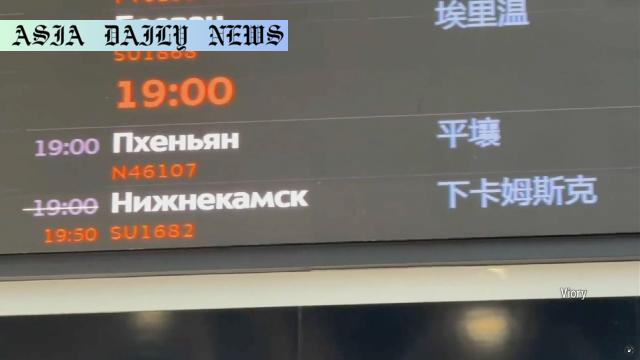Direct Flights: Russia begins first direct air service between Moscow and Pyongyang in three decades, signaling stronger ties.
- Russia’s Nordwind Airlines launched direct flights between Moscow and Pyongyang.
- This is the first air service between the two capitals in 30 years.
- The flights symbolize deepened ties following a strategic partnership agreement.

Resuming Direct Flights After Three Decades
After a 30-year hiatus, direct passenger flights between Moscow and Pyongyang have resumed, marking a significant milestone for relations between Russia and North Korea. The flights, operated by Russia’s Nordwind Airlines, indicate a strengthening partnership between these two nations. The inaugural flight, which took place on Sunday, saw the majority of its passengers being North Korean citizens, highlighting its primary purpose of connecting people. The airline has announced plans to operate this route once a month, offering an 8-hour flight at an approximate cost of 45,000 rubles (equivalent to 560 US dollars).
Strengthening Bilateral Relations
These flights signal a growing diplomatic and economic connection between Russia and North Korea. Following the signing of a comprehensive strategic partnership agreement in June of the previous year, both nations have displayed intentions to fortify their ties through various means, including trade, commerce, and now air connectivity. North Korea’s isolation from much of the world, owing to international sanctions and political challenges, makes Russia an invaluable ally. This new air route is a testament to their mutual cooperation and shared strategic interests.
The Broader Implications
This development carries significance beyond the logistics of better connectivity. It could potentially pave the way for increased economic interactions, cultural exchanges, and strategic collaboration. However, it might also raise eyebrows internationally, considering North Korea’s contentious global standing. Facilitating smoother travel between the two countries could provide North Korea with an economic lifeline at a time of heightened tensions with its Western counterparts. Furthermore, these flights may serve as a symbol of Russia’s defiance amidst its strained relations with Western democracies.
A Deeper Insight into Costs and Accessibility
With ticket prices estimated at 45,000 rubles or 560 dollars, the flights might not cater to low-income individuals. However, the affordability for regular travelers, business delegates, or diplomatic envoys still makes this route a strategic investment. It also opens new opportunities for North Korean citizens to leave their hermit-like existence, though travel restrictions within North Korea are notoriously strict. For Russians, it could be an opportunity to explore one of the most secluded nations worldwide, should Pyongyang implement policies favoring tourism and exchanges.
Overall, the resumption of direct flights between Moscow and Pyongyang serves as a significant development, shedding light not only on better connectivity but also on the broader implications of evolving alliances amid a shifting geopolitical landscape.



Commentary
A Symbolic Step Towards Stronger Russia-North Korea Relations
The resumption of direct flights between Moscow and Pyongyang after 30 years is not just a matter of convenience; it is a reflection of the strengthening ties between Russia and North Korea. In an era where international relations are complex and often driven by strategy, this collaboration will likely set the stage for more significant developments. These flights might initially cater to a niche audience—businesspeople, officials, and North Korean citizens—but their symbolic value is immense.
Impact on Global Geopolitics
From a geopolitical standpoint, this development highlights the continuing division between Western powers and Russia. While North Korea remains largely isolated due to its controversial policies and nuclear ambitions, Russia’s willingness to engage signals a commitment to diversifying its list of allies. This collaboration might concern nations that have long tried to restrict North Korea’s access to international partnerships. Nonetheless, it also reaffirms Russia’s position as a counterbalance to Western influence.
The Potential Role of Economic and Cultural Exchange
On a more optimistic note, these flights could promote economic and cultural exchange, paving the way for greater understanding between the citizens of Russia and North Korea. North Korea is known for its rich, albeit unexplored, culture and history, which could appeal to Russian travelers. Similarly, Russians visiting North Korea might bring with them new ideas and experiences, contributing to a subtle yet impactful cultural dialogue.
In conclusion, the resumption of direct flights is a small step that might have larger ripple effects in the months and years to come. It shows that diplomacy and collaboration can manifest in the most unlikely pairings, underlining the importance of global connectivity in all its forms.